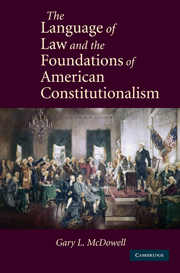Book contents
- Frontmatter
- Contents
- Preface and Acknowledgments
- The Language of Law and the Foundations of American Constitutionalism
- Introduction: The Politics of Original Intention
- 1 The Constitution and the Scholarly Tradition: Recovering the Founders' Constitution
- 2 Nature and the Language of Law: Thomas Hobbes and the Foundations of Modern Constitutionalism
- 3 Language, Law, and Liberty: John Locke and the Structures of Modern Constitutionalism
- 4 The Limits of Natural Law: Modern Constitutionalism and the Science of Interpretation
- 5 The Greatest Improvement on Political Institutions: Natural Rights, the Intentions of the People, and Written Constitutions
- 6 Chains of the Constitution: Thomas Jefferson, James Madison, and the “Political Metaphysics” of Strict Construction
- 7 The Most Sacred Rule of Interpretation: John Marshall, Originalism, and the Limits of Judicial Power
- 8 The Same Yesterday, Today, and Forever: Joseph Story and the Permanence of Constitutional Meaning
- Epilogue: The Moral Foundations of Originalism
- Index of Cases
- General Index
- References
1 - The Constitution and the Scholarly Tradition: Recovering the Founders' Constitution
Published online by Cambridge University Press: 05 June 2012
- Frontmatter
- Contents
- Preface and Acknowledgments
- The Language of Law and the Foundations of American Constitutionalism
- Introduction: The Politics of Original Intention
- 1 The Constitution and the Scholarly Tradition: Recovering the Founders' Constitution
- 2 Nature and the Language of Law: Thomas Hobbes and the Foundations of Modern Constitutionalism
- 3 Language, Law, and Liberty: John Locke and the Structures of Modern Constitutionalism
- 4 The Limits of Natural Law: Modern Constitutionalism and the Science of Interpretation
- 5 The Greatest Improvement on Political Institutions: Natural Rights, the Intentions of the People, and Written Constitutions
- 6 Chains of the Constitution: Thomas Jefferson, James Madison, and the “Political Metaphysics” of Strict Construction
- 7 The Most Sacred Rule of Interpretation: John Marshall, Originalism, and the Limits of Judicial Power
- 8 The Same Yesterday, Today, and Forever: Joseph Story and the Permanence of Constitutional Meaning
- Epilogue: The Moral Foundations of Originalism
- Index of Cases
- General Index
- References
Summary
The Constitution of the United States was born in controversy, and thus has it lived. From the time of the ratification struggle and the debates between the Federalists and the Anti-Federalists, to disputes between the Jeffersonians and the Hamiltonians, to the debate between Chief Justice John Marshall and President Andrew Jackson, to the crisis of the house divided and the impassioned rhetoric of Abraham Lincoln and Stephen A. Douglas, throughout American history the question of how to interpret the Constitution has animated and divided public opinion. The reason, of course, is that the Constitution is a document explicitly designed to order the nation's politics; politically, a great deal hangs on the peg of interpretation.
Since the last quarter of the nineteenth century there has been a growing public debate of a rather different sort over constitutional interpretation. It is, at one level, a debate that is part of the earlier American political tradition; but at another level it is unlike the other great constitutional debates up to that time. In those earlier debates, the line was typically drawn between those who understood themselves to be “strict” constructionists (such as Thomas Jefferson) and those who saw themselves as “fair” or “reasonable” constructionists (such as Alexander Hamilton and John Marshall). The question for both groups was how to read the Constitution.
- Type
- Chapter
- Information
- Publisher: Cambridge University PressPrint publication year: 2010



